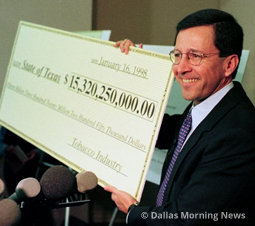© 2015 The Texas Lawbook.
By Mark Curriden
AUSTIN (April 15) – Texas Assistant Attorney General Harry Potter picked up his work phone in the fall of 1998.
“Your boss is a crook!” Arthur Golden, a highly respected corporate lawyer at the Wall Street law firm Davis Polk & Wardwell, screamed at Potter.
“A crook!”

While the two lawyers were zealous advocates on opposite sides in the fierce litigation, Golden, who represented Big Tobacco, and Potter, who was Texas Attorney General Dan Morales’ point man in the case, still respected each other professionally.
“Arthur was livid,” Potter says about the conversation 18 years earlier. “He talked about secret lawyer contracts with a lawyer friend of Dan’s named Marc Murr. I didn’t know anything about, but it sent chills throughout my body. I knew right away, something was wrong.
“That phone call, I can honestly tell you, actually led to Dan going to prison,” he says.
“I don’t remember exactly what I said, but I know I was disgusted,” Golden says.
Now a trial lawyer in Houston and an expert on legal ethics, Potter refused to discuss the tobacco litigation and his role in the criminal investigation of Morales for 18 years. This week, he gave a series of exclusive interviews to The Texas Lawbook on the 20th anniversary of the filing of the Texas tobacco lawsuit.
Federal prosecutors and FBI agents involved in the Morales investigation describe Potter as “possibly the best potential witness ever” in a public corruption investigation because of “his absolute honesty and his lack of self-interest” in the case.
“Harry Potter is a great lawyer and he is above reproach,” says Mississippi Attorney General Mike Moore, who led the national litigation against Big Tobacco. “Harry was put in an almost impossible situation, to have to go against his mentor and boss, but he did what was right and he did it without any praise or accolades.”

To understand the magnitude of the Texas tobacco litigation and how it became corrupted, Potter says people need to know the key people involved and how it all happened.
No one knows more than Harry G. Potter.
Who is Harry Potter?
A 1988 graduate of the University of Texas School of Law, Potter went to work for the Texas Attorney General’s office immediately upon getting his law degree. He represented state court judges whenever they were sued and he defended state laws that were being challenged as unconstitutional.
Potter successfully defended challenges to the Texas sodomy law – a position that he said later bothered him even back then. His first meeting with Morales came a couple years after the young AG took office.
“He had a regular event called ‘Coffee with the General,’ which was meant to celebrate or recognize successes by lawyers in the office,” he says. “He handed us a coffee mug, but there was never any coffee in it.”
Potter points out that Morales followed Jim Mattox as Texas Attorney General in 1991.
“Mattox was very aggressive, while Dan was much more conservative, more cautious and more pro-business,” he says.
Morales, a Harvard University Law School alum, was a shining star in the Democratic Party. Hispanic and conservative, he regularly had better approval ratings than the governor he served, George W. Bush.
Seeds of Tobacco
In 1995, Morales promoted Potter to special assistant and the pair met with Mississippi Attorney General Mike Moore, who had sued the tobacco companies a year earlier in an effort to reimburse the state for smoking-related medical costs.
“Mike met with us, trying to get Texas to file its own lawsuit,” Potter says. “Political advisers told Morales that he was a lock for re-election, but that pro-business groups would challenge him if he sued the tobacco companies.
“Dan made a truly gutsy call,” he says. “He took an extreme political risk. He did the right thing.”
During the next few months, Morales and Potter met with lawyers across Texas about representing the state in a possible lawsuit against the cigarette makers.
When the tobacco companies learned Morales was considering joining Mississippi, Minnesota, Florida, West Virginia and Louisiana by suing the companies for healthcare costs, the cigarette makers took a proactive step by going to court to ask a judge to prohibit Morales from filing such a complaint.
The courts quickly rejected Big Tobacco’s preemptive strike as having no basis in law.
“That lawsuit by the tobacco companies demonstrated the industry’s scorched-earth litigation tactics and showed us we needed to hire trial lawyers with deep pockets who could fight back,” Potter says.
Morales chose Walter Umphrey, John Eddie Williams, Wayne Reaud, Harold Nix and John O’Quinn. The five Texas lawyers agreed to pay all costs for the litigation and would receive 15 percent of any money they won for the state. If the state lost, the lawyers would get nothing.
“The Big Five turned out to be a fantastic choice,” Potter says. “The lawyers did amazing work.”
Who is Marc Murr?
About halfway through the litigation, Morales approached Walter Umphrey and the other lawyers about adding a new lawyer named Marc Murr, a law school buddy, to the team and to the contract.
“Walter went ballistic and threatened to walk out,” Potter says. “Walter said if Murr was brought into the case, he would not be involved at all.”
“I don’t need his help and I don’t want his help,” Umphrey told Morales. “As a taxpayer, I am offended.
As quickly as Murr, a Houston solo practitioner who worked in a small office with no staff, had surfaced, he was gone.
A year later, in 1998, the Texas case settled for $17.6 billion. The tobacco companies established a special arbitration panel to award legal fees to private, outside lawyers working for the states.
 The panel awarded the Umphrey group $3.3 billion.
The panel awarded the Umphrey group $3.3 billion.
Suddenly, Murr reappeared, seeking money from the national arbitration panel. This time, he had a contract dated 1996 and signed by Morales stating that Murr should get three percent of the $17 billion Texas settlement – or $519 million.
It was then that Golden called Potter claiming that Morales was a “crook.”
“The plaintiffs’ lawyers were making a lot of money – probably too much money – but they were doing it within the rules and the system that had been developed,” Golden says. “This deal involving [Murr] disgusted me.”
Secret Contracts
Potter decided to check for himself. He secretly signed into the state attorney general’s internal network and looked into the private folder of Morales’ secretary.
He discovered three separate contracts. Each was signed by Morales, Murr and others.
“The creation date of the documents didn’t match the dates of the signatures,” Potter says. “I printed the contracts just in case they mysteriously disappeared.”
To support Murr’s petition, Morales filed an affidavit with arbitrators stating that Murr was his “co-pilot in the tobacco litigation.” The attorney general stated in writing that Murr was his “primary adviser regarding the negotiation/settlement of the litigation.” At other points, Morales said Murr was his “secret weapon.”
The same week of Golden’s call to Potter, The Dallas Morning News obtained the three contracts and Morales’ affidavit from lawyers involved in the litigation. The newspaper hired two former FBI forensic document experts to examine the contracts.
‘Severe Document Manipulation’
The contracts, the experts told The News, were the result of “severe document manipulation.” The signature lines in the contracts were copied and pasted from other contracts, the experts stated.
The Dallas Morning News quoted more than a dozen lawyers intimately involved in the litigation who said that Murr attended none of the witness depositions, signed no court documents, made no courtroom appearances in the litigation and participated in none of the settlement discussions. They scoffed at the notion that Murr was Morales’ co-pilot.
“I was in the cockpit for the entire litigation and I never saw Marc Murr once,” Ron Motley, a South Carolina lawyer involved in the case, told The News in 1998.
In an explosive allegation, a source identified by The News as “a lawyer involved in the litigation” told the newspaper that the three contracts were backdated.
The contracts show they were signed in 1996, but they weren’t actually created on the state’s computer until 1998, The Dallas Morning News reported.
“I cannot tell you the entire story right now, but one day, I will be able to explain everything to you,” Morales told The News in an interview in 1999.
Morales never spoke to the journalist again.
“I can tell you that The Dallas Morning News articles totally freaked Dan out. Your* articles scared Dan to death,” Potter says. “He was noticeably shaken.”
Enter the FBI
Just a few days later, Mississippi Attorney General Mike Moore, who was the leader of the national litigation against the cigarette makers, received a call from the FBI.
“They asked me if I had been at the tobacco settlement meetings and whether I had seen Marc Murr attend any of them,” Moore says. “I said I attended every single meeting and that I never heard of the guy and never saw him at any of our meetings. The only reason I knew Murr’s name was because of The Dallas Morning News articles.
“Harry Potter was the only lawyer from the state of Texas at the meetings and I knew Harry was as honest as could be,” Moore says.
The arbitration panel awarded Murr only $1 million, which he returned a few months later.
Concerned by the mounting evidence, Potter reported his suspicions to the chief of the Texas Attorney General’s criminal justice division, who contacted the FBI.
A four-year-long investigation ended in 2003 with a federal grand jury indicting Morales for his role in trying to secure the fees for Murr and for illegally using campaign contributions to buy a house. He pleaded guilty to some of the charges and served nearly four years in prison.
“Its like a Greek tragedy,” says Potter. “Was it hubris? I fear he saw all these people getting rich and he got nothing personal from it even though he took all the risks. We may never know the real reason.
“It was so sad that such a brilliant person could make such mistakes of such a monumental proportion,” Potter says. “We did a lot of great work and achieved some amazing successes, but I am afraid that it will all be tainted by Dan’s actions and extremely poor judgment.”
*Editor’s Note: Texas Lawbook writer Mark Curriden was the reporter for The Dallas Morning News who authored the articles in 1998 and 1999 about Morales and the tobacco companies.
© 2016 The Texas Lawbook. Content of The Texas Lawbook is controlled and protected by specific licensing agreements with our subscribers and under federal copyright laws. Any distribution of this content without the consent of The Texas Lawbook is prohibited.
If you see any inaccuracy in any article in The Texas Lawbook, please contact us. Our goal is content that is 100% true and accurate. Thank you.
